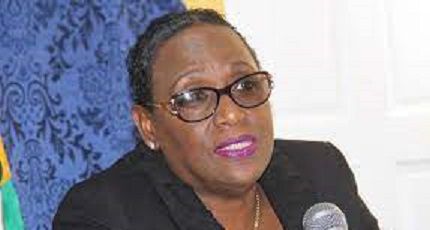Defence lawyer Kay Bacchus-Baptiste has been moved to respond to recent remarks made in relation to the Magistracy, during a live Facebook posting that featured Prime Minister Dr. Ralph Gonsalves and Commissioner of Police Colin John reporting on a meeting they held to address the crime situation here.
Speaking on Tuesday, veteran attorney Kay Bacchus-Baptiste said she was upset with certain comments that ensued during the posting which purported to point finger at the Magistracy.
Inter alia, the remark included one to wit, “… the way certain decisions were made, but the actual decisions in some instances, the Magistrates Court, some of the, (decisions) puzzled the police, and puzzled right thinking persons.”
Dr. Gonsalves, however, went on to acknowledge the independence of the Judiciary and said “of course we can’t interfere with those things, there is a Judicial process.”
Bacchus-Baptiste told said that, “The public is not upset with the Magistracy, the public is upset with the way the Director of Public Prosecutions (DPP), and the police have been handling some cases.
“Many cases, she said, “fell because of the way they were handled by the DPP, and the police.”
In relation to sentencing, Bacchus-Baptiste said, “The Magistrates’ hands are tied. They have to sentence according to the law and the sentencing guidelines, and be cognizant that the circumstances in each case are different.
Commenting on the recent sentencing of staff nurse Lucresha Nanton to two years and ten months in prison for the possession of 59,939 grams (132.143 pounds) of cocaine with intent to supply, Bacchus-Baptiste said, “I don’t know if this is one of the puzzling decisions that the Prime Minister was speaking about, but he should ask the DPP why that matter was in the Magistrate’s Court and not the High Court.”
In her opinion, that matter should have been heard in the High Court, based on the seriousness of the charges, the large amount of cocaine and the limited sentencing powers of the Magistrate.
The maximum penalty for this offence in the Magistrate’s Court is seven years and $500,000, while the maximum penalty for this offence in the High Court is 25 years and $5 million.
She explained that in sentencing, the court has to set a starting point, weigh the mitigating factors against the aggravating ones, and apply a discount for guilty pleas.
Bacchus-Baptiste said that to maintain confidence in the public, the DPP should make a public statement as to why that matter did not go to High Court.
“The most serious offences go to the High Court, but that was not done in this case, and that’s why the public seems to be concerned,” the lawyer said, adding, “You can’t blame the Magistrate.”
Asked whether there was any rule which prevents anyone in the Magistracy from responding to comments such as those made by the PPM and the Commissioner, the lawyer said, “I don’t know of any rule, but it is not usually done. There is supposed to be separation of powers between the Judiciary and executive, and it would not foster confidence in the administration of justice to have any back and forth between them.”
During a sitting of the Serious Offences Court on Tuesday, Bacchus-Baptiste told Chief Magistrate Rechanne Browne, “I hope you would have an enjoyable year and do your work with non-interference.”
With a smile, the Magistrate thanked the lawyer and said, “I hope I will be allowed to do my work as it ought to be done.”
The Magistrate spoke of the separation of powers and said that, “Being a creature of statute, I have to be guided by statutes.”
She contended that “There are certain things that can be done,” but added that certain things can only be done if the statute is amended.
Source :The Vincentian





